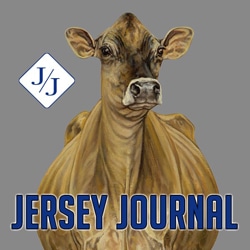Jersey Jargon, October 2019

The dairy industry has long understood the value of milk fat and protein. New on the horizon are other milk components, including the phosphoproteins beta casein and kappa casein, now being studied to determine their impact on human health and dairy food processing.
Dairy producers have been able to genotype their cattle for beta casein for several years and are now able to test for kappa casein as well. Though there are more questions than answers at this point, research will certainly yield opportunities. Discoveries are guaranteed to impact dairy farmers through their breeding programs. And, because genetic selection is one route dairy producers use to potentially increase the milk check, many are looking for genomic information on milk proteins.
The American Jersey Cattle Association (AJCA) has compiled this information from the August 2019 genetic evaluations in a report carried in the Jersey Genetic Summary, commonly called the Green Book. The list is not an official AJCA report, but rather, a single source of genotypes gathered through direct communication with marketing organizations or from their websites.
Jersey breeders can find the list for Active A.I., Foreign and Genomic Evaluated bulls at https://greenbook.usjersey.com/MarketedBulls.aspx.
In this month’s Jersey Jargon, we’ll briefly explain what the list contains.
List Content
The document is available in Excel and PDF formats. The following information for A-code, F-code and G-code bulls is included when it has been provided: registration name and number, NAAB code, beta casein A2, kappa casein and JPI. Beta casein is reported as A1A1, A1A2, A2B (a variant of A1A2) or A2A2. Kappa casein is reported as AA, AB, BB or BE.
Of the 526 bulls that were included on the list, 82% have genotypes for beta casein A2 and 79% have genotypes for kappa casein. Of those with beta casein A2 genotypes, 63% are A2A2, 18% are A1A2 and the balance are A1A1 or A2B. Of those with kappa casein genotypes, 68% are BB, 11% are AB and the balance are AA or BE.
Some Background
Milk protein consists of about 78% casein, largely categorized as alpha-S1 casein, alpha S2 casein, beta casein and kappa casein. Beta casein is an important gene for milk yield and protein content. Kappa casein is associated with protein percent and yield.
Beta casein is produced by the CSN2 gene. Fifteen genetic variants of CSN2 are known to cause changes of certain amino acids in the beta casein protein. These variants are classified into one of two groups: A1 or A2. The A2 variant is positively associated with milk yield and protein content. For variants in the A1 group, the levels of bioactive peptide beta-casomorphin 7 (BCM-7) produced from metabolism of beta-casein are several-fold higher. These higher levels of BCM-7 have been associated with negative health effects in humans.
In recent years, some dairy producers have thus focused on increasing the frequency of A2/A2 genes in their herds to capitalize on markets for A2 milk.
Jersey breeders can genotype their cattle for A2 through the AJCA as an add-on to purchase of the 9K uLD (ultra-low density), 45K LD (low density) or HD (high density) chips or as a stand-alone test bundled as A2, beta lactoglobulin, kappa casein and beta casein AB. For prices, visit infoJersey.com. Look under the “Services” tab and then the “Genomics” tab.
Jersey breeders can learn more about milk proteins and options for incorporating A2 in the breeding program by viewing a video (AJCA-NAJ A2 Milk Review) on the AJCA YouTube channel at https://www.youtube.com/watch?v=yx9otHl1xJg.
Results from the A2 milk study co-funded by National All-Jersey Inc. and the A2 Milk Corporation are expected this fall. The goal of the double-blind study being conducted by Dr. Dennis Savaiano and his colleagues at Purdue University is to determine if A2 milk is beneficial for people known to be lactose intolerant. As well, it aims to determine if Jersey milk, which is high in A2 but not fully A2, delivers the same benefits as A2 milk.
